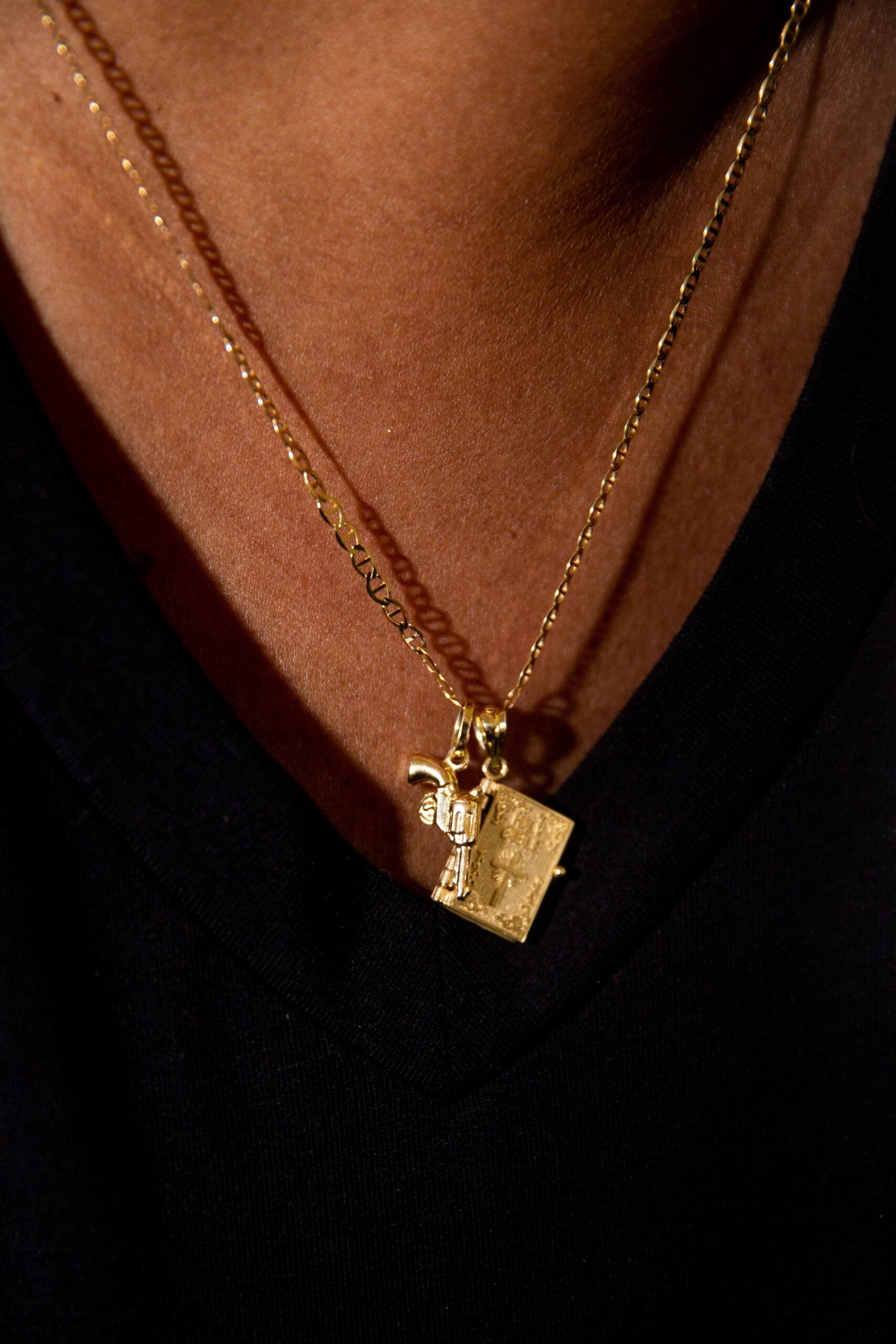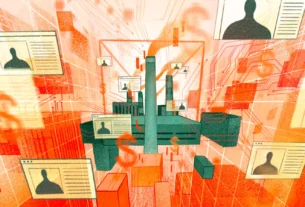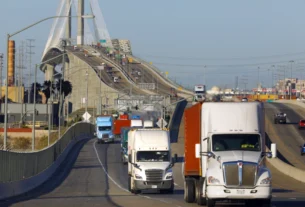
Pandemic, police violence, calls to ‘defund the police’ fuel surge of first-time buyers
All his life, Jabril Battle was anti-gun. Then came the pandemic, the lockdown, the shortages and a feeling that at any moment, things could blow. Battle bought a Beretta.
Drawn to last summer’s protests against police violence, Savannah Grace found herself face-to-face with a camo-clad officer’s long gun. She’d always hated guns, but went out and got a Glock 45.
In blue cities and red suburbs alike, firearms purchases soared last year — to the highest level in half a century, based on federal background checks. A striking portion of those sales went to first-time gun buyers — 40 percent, according to the firearms industry’s trade association. Other studies show first-timers accounting for more like a fifth of sales in 2020, but that’s still unusually high, retailers said.
verall gun ownership nationwide jumped from 32 percent of Americans to 39 percent last year, according to University of Chicago survey data — well under the 50 percent level of half a century ago, but the biggest jump in recent decades.
From the downtown streets left empty by the pandemic’s shutdowns to the sharp spike in homicides and the nationwide conflict over the role and behavior of police officers, a disorienting and often frightening year drove many decisions to buy guns, according to dealers and buyers alike.
“It really was a perfect storm of concerns” that drove sales, said Mark Oliva, spokesman for the National Shooting Sports Foundation, which tracks the numbers.
Shakima Thomas, a social worker in Newark, had always thought of guns as loud and dangerous — nothing she wanted anything to do with.
She grew up around firearms; her grandmother carried a handgun in her purse, and several close relatives had served in the military and owned guns. But Thomas, 39, never considered buying one for herself until Donald Trump’s presidency. Trump’s boast that he could shoot someone on Fifth Avenue and not lose any of his support made Thomas fear that some Americans might be emboldened to express their rage violently.
A lifelong Democrat, she got a gun permit early in the Trump administration but didn’t buy her first gun until last summer, when the killing of Floyd and the protests that spread across the nation made Thomas feel like the country was spiraling out of control, “like the world was in an apocalypse.”
She walked into RTSP — a gun store whose name stands for Right to Self Protect — and bought an AR-15 assault rifle. Months later, she added a handgun.
“I never felt like I would want to own a gun because of the damage I thought they do to people,” she said. “But when I started feeling unsafe, all of that changed.”
Sales to women and people of color rose in 2020. Firearms industry data shows sales jumping 50 percent among Black customers, 47 percent among Hispanics and 43 percent among Asian Americans, though gun ownership remains proportionately lower among those groups compared with Whites.
“Typically, my customers were always White men and White women concerned about who was president and what restrictions were coming,” said Michael Cargill, owner of Central Texas Gun Works in Austin. “Then last summer, you had the protests and downtown was basically boarded up. Law enforcement all went downtown. Right away, we had lines out the door every day.”
“It didn’t matter if you were Democrat or Republican, White or Black,” said Cargill, who is Black. “One side said, ‘Trump’s going to be reelected and it’s going to get violent,’ and the other said, ‘Biden’s going to win and he’s going to come after the guns.’ My instructors and I became like gun therapists for people who never had guns before or really didn’t like guns. One lady came in here in tears, with her teenagers, and she said, ‘This goes against everything I believe in, but I need my family to learn how to protect themselves.’”
The new gun buyers included many women who felt vulnerable to a wave of violent crime. Some were Black city dwellers such as Karen Williams-Adir, a former Los Angeles bus driver who now writes fiction, and some were White conservatives living in the heartland.
Williams-Adir, 49, feels safe at home in Ladera Heights, an affluent enclave on Los Angeles’ west side, but over the past few years, she’s been unnerved by news of mass shootings, police brutality and Trump’s “America First” rhetoric.
“Certain people, certain colors were being targeted,” she said. “I started getting angry because I don’t understand why people just don’t respect people’s space.”
But it wasn’t until the Floyd killing and the explosion of anguish that followed that Williams-Adir decided to buy a gun.
“What happened to George Floyd just flipped my wig,” she said. “It was just too hysterical. People were on edge. Enough was enough. I figured, if you want to come to my home and do harm to me for any reason, you might not ever go home again to yours.”
She worried about being stopped — particularly by police — as she moved about the city. “If I do everything you tell me to do and don’t resist and I’m not armed, will I walk out of here alive?” she wondered.
Despite her concern about police violence, she’d still call them to her home if she needed help. But having a gun at home means she no longer feels the need to rely on them.
First, Williams-Adir bought a .32 Beretta, a gun petite enough to fit comfortably in her hands. Since then, she’s added two other handguns and a shotgun. The weapons, she said, give her peace of mind.
“It just felt like we needed to be able to defend ourselves,” Williams-Adir said, speaking especially of Black women. “And I’m not bringing a knife to a gunfight.”
Schuyler Brubaker, a 21-year-old senior at Oklahoma State University, also perceived growing danger in her college town of Stillwater. Her perception of risk stemmed not from racial tensions, political protests or police behavior but from news headlines about sex trafficking and attacks on young women who were exercising alone or using ride-hailing services.
In her conservative community, she sensed a lot of fear that a Democratic administration would impose strict gun controls. At a sporting goods store one day, she heard a woman “talking about how she thought ‘I’d better go get [a gun] before Biden’” won the election.
“I’m a Republican, and I don’t care for Biden,” Brubaker said, “but I didn’t think he was going to come and steal anyone’s guns.”
Rather, what drove her to the gun shop was her sense that violent crime was coming too close for comfort. “I’ve had friends who have almost been abducted,” she said. “Stillwater is not not a safe place, but there are some sketchy people here.”
Murders and other types of violent crime are rare in Stillwater, though homicide numbers soared last year in many U.S. cities.
Last summer, soon after she turned 21, Brubaker and four friends signed up for a concealed-carry training course. Then she bought herself the same kind of compact 9mm Smith & Wesson pistol that her godmother, a certified instructor, taught her to shoot when she was 13.
Brubaker, a fashion merchandising major, said she inherited her acute concern for personal safety from her mother, whose career as a paramedic and then a nurse exposed her to plenty of trauma.
Her mother doesn’t own a gun, but she “made me watch the news” and kept Brubaker aware of Amber Alerts, leaving her daughter “overly cautious,” Brubaker said. “Besides, I have no upper-body strength whatsoever, so me trying to fight my way out of a bad situation isn’t a good option.”
Now, Brubaker said, her gun lends her a sense of security: “If I want to go for a walk around the lake or if I want to go hiking by myself, I carry it with me.”
Politics — along with mass shootings and natural disasters such as 2005′s Hurricane Katrina — have long driven gun sales. For decades, whenever a Democrat has been elected president, several months of surging sales have ensued, as customers concerned about the prospect of tighter restrictions on guns hurried in to stock up.
“The more an administration talks about gun control, the more you’re going to hear cash registers ring,” Oliva said.
But Thomas, the Newark social worker who bought a rifle and pistol last year after protests against police violence made her feel unsafe, said she remains a committed Democrat. She agrees with the cause that peaceful protesters promoted last summer, yet the chaos and destruction she saw in her city and around the country pushed her to take action to defend herself. In the end, she said, her attitude toward guns does not define her political identity.
For many new gun owners, though, the decision to arm themselves is a political pivot — an accumulation of anxieties that led them to discard long-held beliefs. It’s a decision that is particularly difficult for people who belong to groups at higher risk of being on the wrong end of gun violence.
Jabril Battle, a 28-year-old account representative at a financial services company in Los Angeles, had always believed that “anyone who had a gun was a gun nut,” he said. “I really bought into the whole idea that the more people have guns … the more likely it is for people to start killing each other.”
But as the pandemic paralyzed the nation, Battle said, “I just saw how crazy people got.” He found himself conjuring the worst scenarios: “I was like, if my block has 10 houses, how many people in these houses have guns? If the food and water gets cut off, [if] supplies run out … what does that look like? Is this going to be a ‘Mad Max’ situation? Like ‘The Walking Dead,’ but not with the zombies?
“I was just, like, ‘Do I want to be the person who has a gun or doesn’t have a gun?”
Battle bought a Beretta 92FS, then added a Glock 34 pistol.
Still, he had reservations: “Being Black with a gun is a very high risk, a way higher risk than other races,” he said. “You are seen as a threat without a gun, and with a gun you are seen as a super threat.”
He kept imagining the scene if he were stopped by a White police officer.
“It’s still in my head, honestly, when I go to the gun range and I have my gun in my car,” he said. “If I get pulled over, and they ask, ‘Are there any weapons in the car?’ [and] I say there’s a gun, and then I hand in my registration, will they shoot me?”
But he’s enjoying the new world that guns opened to him — classes, an organization of Black gun owners, shooting competitions.
“Once I started being around guns more, and I kind of saw the culture and the environment, I’m falling in love,” he said.
In Battle’s family, guns were “not a good thing,” he said. “It kind of represented crime, especially for Black people. It’s just different for African Americans.”
But his family has accepted his decision, he said. His grandmother and two aunts came to the range with him and are considering returning to take lessons.
The powerful emotions that drive both sides of the gun debate cause many gun dealers to try to keep politics out of their shops — a stance that became even more important over the past year, as demand surged.
“We don’t take any positions and we don’t make any judgments,” said Charrie Wexler, a firearms instructor who works with her husband, Brandon, at Wex Gunworks in Delray Beach, Fla.
Starting with the coronavirus shutdowns in March 2020, “we got a massive increase in women, Blacks, Asians, transgender people,” she said. “They started coming in when there was all that talk of defunding the police and when people didn’t know what covid would mean and worried that people might come to their homes trying to get their supplies.”
“It was like watching one of those end-of-the-world movies,” Brandon said. “You saw fear.”
“Fear on top of fear on top of fear,” Charrie said. “Women, especially, would say, ‘I don’t believe in guns, I don’t like them, but the world has gone crazy.’”
In a scary time, Savannah Grace wanted not just protection, but a sense of belonging and community. A transgender woman who took part in protests in Richmond last summer, Grace, 31, grew up in a home where guns were culturally alien. But the combination of being confronted by law enforcement officers at protests and feeling endangered because of her gender identity prompted her about-face.
“I’ve been threatened just for being who I am,” she said. Being armed was a way to assert control and gain political power: “As soon as any marginalized group starts arming themselves, that’s when policy gets pushed through a little bit more,” she said.
She started going to a gun range with a friend who was a veteran enthusiast. She liked how shooting made her feel. And she liked the array of people at the range — “people of color were there,” said Grace, who is White, “and other queer couples were there, so that was kind of fun to see. ‘We’re here!’”
She signed up for a concealed-carry course through an organization called Armed Trans Women “and then one day, I was just like, I’m going to do this,” she said.
She bought a Glock 9mm handgun, which she keeps loaded in her dresser. She makes sure to handle it almost every day, “just to make sure I’m comfortable with it.” She feels safer now, especially since she lives “in a household that could be targeted by people. We fly a rainbow flag and people in my house are known activists.”
She doesn’t expect to use the weapon. She’d be unlikely “to shoot a burglar or something like that,” she said. “Like, if they’re stealing my TV, they probably need it more than I do.”
But when she’s going to a protest where she expects to be near “right-wing gun owners,” she carries openly, “just to be, like, ‘Hey, we both have these, let’s keep our distance.’”
Other than her attitude toward guns, Grace’s politics haven’t changed, but she’s had to alter the way she thinks of herself: She now defines herself as a gun person “who hates gun people.”


